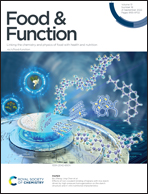Different effects of Bacillus coagulans vegetative cells and spore isolates on constipation-induced gut microbiota dysbiosis in mice†
Abstract
Bacillus coagulans (B. coagulans) can improve and prevent functional gastrointestinal disorders. However, there has been little discussion in the literature on the difference between spores and vegetative cells for relieving constipation. The purpose of this study was to determine the efficacy of Bacillus coagulans (B. coagulans) vegetative cells and spores against loperamide-induced constipation in mice. According to our findings, B. coagulans vegetative cells and spores differ in their ability to relieve loperamide-induced constipation. Two of the three strains of B. coagulans spores used in this experiment, B. coagulans GBI-30 6086 and B. coagulans 90, were significantly different from the model group in relieving constipation. This mainly manifested as a decreased time required for first black stool defecation (by 52 and 79 min, respectively), and increased counts of the first black stools in 5 h (by 15 and 8, respectively), the small intestine transit rate (by 23.31% and 20.52%, respectively), and the concentration of SCFAs. While the administration of vegetative cells could only relieve some indicators of intestinal transit disorders and dysbacteriosis caused by constipation. Spores of B. coagulans GBI-30 6086 and B. coagulans 90 had higher survival rates in the simulated gastrointestinal tract environment, which indicated that the functional modes of the three strains were different and had a strong relationship with the morphology of the bacteria. B. coagulans GBI-30 6086 and B. coagulans 90 spores alleviate constipation by increasing the abundances of Actinobacteria, Deferribacteres, and Lachnospiraceae UCG-006 (which were positively correlated with SCFAs) and decreasing the abundances of Cyanobateria and Rikenellaceae_RC9_gut group (which were negatively correlated with SCFAs) and the levels of Ruminococcaceae UGC-014 and Alistipes. In this study, the effects of probiotics in the form of spore or vegetative cell were compared, and the optimal preparation form was determined, providing a theoretical basis for the application of probiotics of B. coagulans to relieve constipation.



 Please wait while we load your content...
Please wait while we load your content...